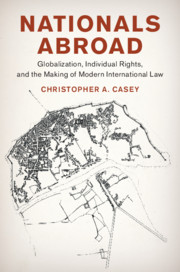(Source: CUP)
Cambridge University Press is
publishing a new book on the history of international business interests and
the creation of the international human rights regime in the late 19th
and 20th century.
ABOUT THE BOOK
It is a fundamental term of the
social contract that people trade allegiance for protection. In the nineteenth
century, as millions of people made their way around the world, they entangled
the world in web of allegiance that had enormous political consequences.
Nationality was increasingly difficult to define. Just who was a national in a world
where millions lived well beyond the borders of their sovereign state? As the
nineteenth century gave way to the twentieth, jurists and policymakers began to
think of ways to cut the web of obligation that had enabled world politics.
They proposed to modernize international law to include subjects other than the
state. Many of these experiments failed. But, by the mid-twentieth century, an
international legal system predicated upon absolute universality and operated
by intergovernmental organizations came to the fore. Under this system,
individuals gradually became subjects of international law outside of their
personal citizenship, culminating with the establishment of international
courts of human rights after the Second World War.
ABOUT THE AUTHOR
Christopher A. Casey, University
of California, Berkeley: Christopher A. Casey received his BA, MA, PhD, and JD
at the University of California, Berkeley.
TABLE OF CONTENTS
Introduction
Part I .Mise en scène: The International Legal World, 1850-–1914:
1. The Walls of Gilgamesh
2. Making Nations, Breaking Nationality
Part II. Mise en scène: The International Legal World, 1919-–1939:
3. Sovereign Nations
4. Sovereign Persons
5. Sovereign Commerce
Part III. Mise en scène: The International Legal World, 1945-–Present:
6. Cosmopolitans and Capitalists
Conclusion
Part I .Mise en scène: The International Legal World, 1850-–1914:
1. The Walls of Gilgamesh
2. Making Nations, Breaking Nationality
Part II. Mise en scène: The International Legal World, 1919-–1939:
3. Sovereign Nations
4. Sovereign Persons
5. Sovereign Commerce
Part III. Mise en scène: The International Legal World, 1945-–Present:
6. Cosmopolitans and Capitalists
Conclusion
More info here


No comments:
Post a Comment